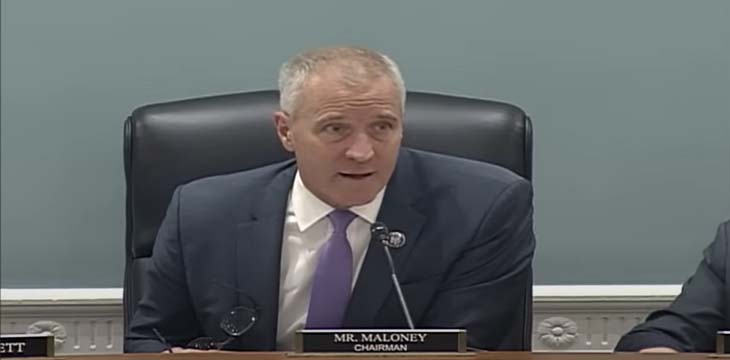|
Getting your Trinity Audio player ready...
|
The U.S. House Agriculture Committee’s Commodity Exchanges, Energy and Credit Subcommittee held a hearing on the future of digital asset regulation last week, with Subcommittee Chairman Sean Patrick Maloney (D-NY) calling the establishment of ‘rules of the road’ for the digital asset industry ‘essential.’
The hearing involved remarks from subcommittee members including Maloney, Michelle Fischbach (R-MN) and G.T. Thompson (R-PA). The subcommittee also heard witness testimony from legal and industry experts such as Christopher Brummer, Professor of Law at Georgetown University; and Jonathan Levin, co-founder and Chief Strategy Officer of Chainalysis.
In his opening remarks, Maloney commented on the rising popularity of digital assets as well as their volatility, pointing to the drastic drop in their market capitalization from approximately $3 trillion in November 2021 to the current level of approximately $1 trillion.
“Providing Congressional direction to establish the rules of the road to ensure American retail investors are informed and protected is as important as ever,” said Maloney.
Today, I led a hearing in @HouseAgDems focused on shaping the future regulation of digital assets. Innovation is shifting how consumers can engage with markets, and Congress must play a role in ensuring proper oversight and consumer protections. pic.twitter.com/jrlqcDksUI
— Sean Patrick Maloney (@RepSeanMaloney) June 23, 2022
This was a sentiment echoed by the witnesses in attendance. Jonathan Levin of Chainalysis told the subcommittee that “the transparency of blockchains enhances the ability of policymakers to detect, disrupt and ultimately deter illicit activity and abuse in cryptocurrency markets” and called for legislative clarity the split of responsibilities between regulators such as the CFTC and the SEC.
Representative Ann Kuster (D-NH) asked Levin how risky digital currency exchanges are. He told the subcommittee that while offshore exchanges are used to facilitate money laundering, there are tools available to regulators that can detect such illicit activity and aid in enforcement.
Congresswoman Fischbach said in her opening statements that the bi-partisan work was important in regulating the financial markets in a way that balances the need for customer protection with protecting innovation.
Indeed, bi-partisan politicking has been a focus for digital asset regulation over the past month. The House Agriculture Committee oversees the Commodity Futures Trading Commission (CFTC), which is in line to have its regulatory remit boosted by a sweeping bi-partisan digital asset bill introduced earlier in June. The Responsible Financial Innovation Act is aimed at improving flexibility, innovation, transparency and consumer protections with regard to digital assets.
Maloney referenced the proposed changes in his opening statements on Thursday.
“While the CFTC has dutifully exercised its role as a regulator and enforcement authority in digital asset markets, its authority is limited. When you couple the recent volatility with high retail participation in digital asset spot markets, it is concerning that there is a gap in oversight and regulation of these markets.”
Representative Troy Balderson (R-OH) asked the witnesses whether they agree that the CFTC is well-suited to regulate spot markets for digital assets. Charles Hoskinson, CEO of Input Output Global, emphasized consideration of the effectiveness of each individual agency in deciding how regulatory responsibility should be shared. Brummer noted that “the CFTC is well behind the SEC in terms of resources. The CFTC is but a quarter of the size of the SEC and enjoys a fraction of the SEC’s budget.”
Appearing as a witness, CFTC Director of the Division of Market Oversight Vincent McGonagle told the subcommitte that the CFTC would require additional authority from legislators in order to create digital asset-specific requirements. Representative Michael Cloud (R-TX) expressed concern about ‘mission creep’ for agencies like the CFTC and SEC.
The bi-partisan hearing identified some of the challenges ahead for reforms like the much-opined about Responsible Financial Innovation Act, while uncertainty about how the division of labour should fall between the CFTC and SEC remains. However, what also remains is a solid bi-partisan commitment to the overarching goal to shore up digital asset regulation in the US: legislators are simply working out the best way to achieve it.
Watch: BSV Global Blockchain Convention panel, Law & Order: Regulatory Compliance for Blockchain & Digital Assets
https://www.youtube.com/watch?v=RzSCrXf1Ywc&t=1013s

 02-14-2026
02-14-2026 




